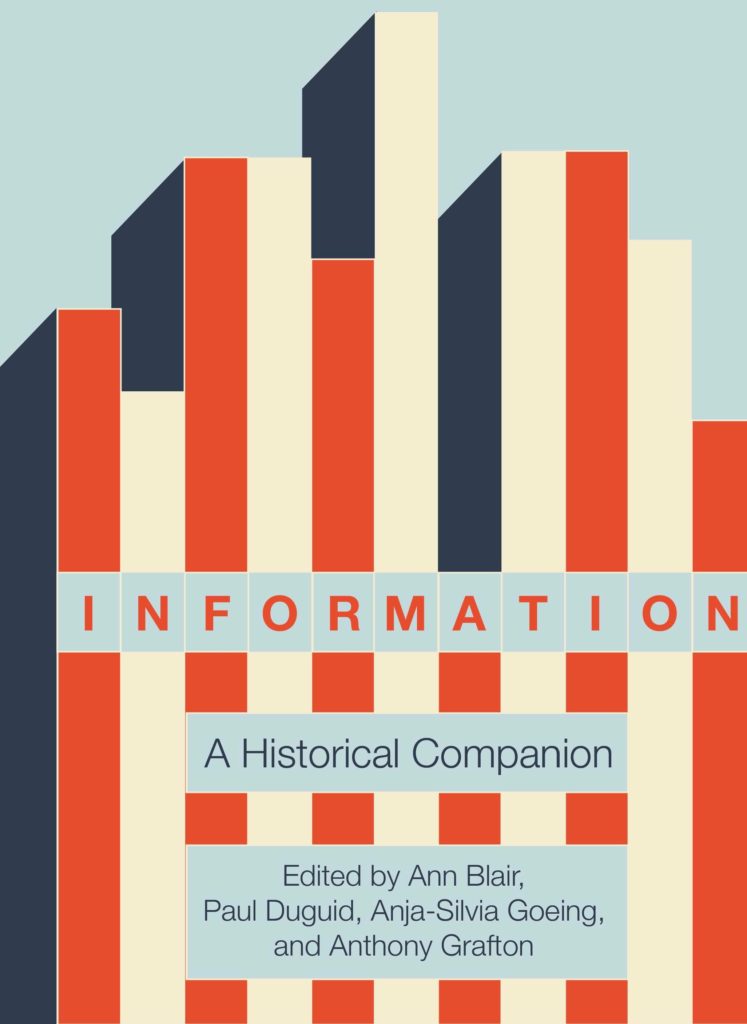By Kathleen Adamson, June 28, 2021

Information: A Historical Companion, Edited by Ann Blair, Paul Duguid, Anja-Silvia Goeing, and Anthony Grafton, Princeton University Press, January 26, 2021, 904 pp., $66.45
We live in a sea of information, but it surrounds us so completely that the word ‘information’ itself is difficult to define. Nowadays we might say ‘data,’ thinking of the vast swathes of personal details, financial records, satellite photos, and security photographs that pile up like sand on servers all over the world. Speaking more generally, the UK-based Geoffery Bateson, originator of The Word’s the Thing, has defined ‘information’ as ‘a difference that makes a difference,’ i.e., a meaningful exception to an obvious generality.
Thankfully, despite the conceptual breadth of its scope, Information: A Historical Companion is an articulate and relevant book that is also a pleasure to consult, a resource much like Sherlock Holmes’ gazetteer, a geographical dictionary he rushed to consult when he wanted real facts about a place. Information: A Historical Companion is authoritative, a singular achievement in these times.
The book clocks in at 904 pages, including the glossary and index. Part 1 is a chronological collection of 13 essays dealing with the history of information culture and distribution. Part 2 contains a series of essays on important keywords, divided into the categories concepts, formats, genres, objects, people, practices, processes, systems, and technologies. The book is organized so that it can be consulted like a reference book as well as read from start to finish. To test this, I read the book in a non-linear manner, alternating between Part 1 and Part 2. It worked. The book makes connections between concepts that are clear and helpful without being repetitive, but each essay can stand on its own. The content is presented clearly, with minimal use of jargon.
A book like Information is intended to provide a general survey, can only be so detailed, but each essay is followed by a short list of further reading from both academic and journalistic sources. The texts include many historical anecdotes as well as general trends and analyses. In the excellent chapter Realms of Information in the Medieval Islamic World, we find a description of the requirements for a treasury administrator, taken from a 14th century Mamluk text:
“Integrity and trustworthiness are the mainstays of this position, for the treasuries of kings in our age cannot be fully inventoried due to their size, abundant contents, and the immensity of their treasures. Were a scribe commissioned to prepare an account of the sultan’s treasury for a single year, he would have to be appointed solely to this task for an entire year without working on anything else. By the time the account was complete [at the end of the second year] and corrected by the secretary of the treasury [during the third year] its anticipated benefit would have long passed. Furthermore, the secretary of the treasury would have neglected the receipts of the last year, having been occupied with the first year’s bookkeeping.”
What we think of as a modern problem—too much information—was evidently a challenge in the 14th century as well. As the tools for acquiring and storing information have improved, so has our impetus to exceed their limits. Dedicated followers of the news may have felt this frustration in a different way, as we try to understand and predict world events with the vast available quantity of personal testimony, journalism, and analysis. How can we meaningfully process this information? By the time an account was complete, the anticipated benefit would have long passed.
Another chapter, from the second part of the book, called Information, Disinformation, Misinformation, quotes the New York Times piously beseeching “every true and patriotic citizen” to beware of news outlets featuring “whole columns of fake news [and] sensational stuff” whose editorial policies were dictated by commercial interests’ and were ‘shocking to our ideals of democracy.’” The year? 1896.
The uses of information, and the communication tools that store and distribute it, are pertinent to many interests. As such, this book will be useful for academics, professional communicators, publicists, and students of history and politics.
Unlike other recent cultural surveys by a single author, such as Yuval Noah Harari’s Sapiens, the contributions of many authors ensure a balanced perspective. According to the introduction, the editors of Information “hope that it will provide a range of audiences with useful and reliable insights, but also that it will prompt readers in the developing field of information history to pursue new questions and fill gaps made evident by this attempt.”
Happily, their efforts have borne excellent fruit.
(Kathleen Adamson is a musician, composer, academic, and community activist based in Montreal, Canada.)
Other reviews by Kathleen Adamson
Hannah Arendt: Deeply influential 20th century thinker embodies contradiction, passion and a proximity to history May 23, 2021
Benjamin Miller: Very rarely does an author take political theory and interpret it with such relevance and clarity May 13, 2021